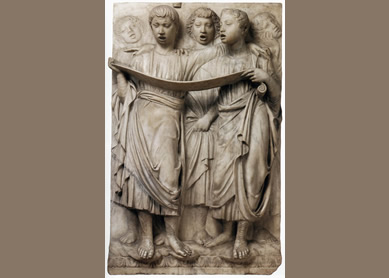This well-recognized and much-loved passage from Paul’s letter to the Corinthians is probably among the most often misunderstood and misused Christian Scriptures. Found in greeting cards or read at weddings, this passage has become associated with a noble and sincere love between a man and a woman. This description of the way of love is intended to capture a couple’s heart and thus lead them toward lifelong commitment. But did you know that Paul probably never considered a marriage ceremony or vow when he penned these words? Understanding the use of the Greek word agape (ah-GAH-pey), which is the word Paul uses for love in this passage, and appreciating the context in which one was to love are essential to understanding Paul’s intent. It is critical to understand how the apostle Paul understood the word love in order to appreciate the true essence of this passage.
How does Paul define love?
One critical reason for the misuse of this passage lies with the English word for love, which can function as a verb (“I love you so much”) and as an abstract noun (“love is so confusing”). As a noun it is an abstract concept that encompasses a range of feelings between the warm thoughts of endearment to the passions of sexual desire. As an English verb, there is no distinction between loving pizza, loving a household pet, and loving God. For Paul, love (agape) has a single meaning, which is defined as “putting the needs of others ahead on one’s own.” It was at the heart of the Christian experience; it shaped the Christian’s understanding of God’s own character and it was the chief expression one Christian would use toward a fellow believer and the world.
In Paul’s description of love, he leaves no room for it to be anything less than attending to the needs of others. The gifts of the Spirit, as useful as they were for the gathered community, were meaningless when performed for personal glory or selfish ambition. Paul’s description of the character of love begins by his mentioning two positive attributes: patience and kindness. Paul follows that by contrasting love to negative attributes; he argues that it is not “envious or boastful or arrogant or rude. It does not insist on its own way; it is not irritable or resentful” (1Cor 13:4-5). In the end, Paul states positively that love “rejoices in the truth. It bears all things, believes all things, hopes all things, endures all things” (1Cor 13:6-7). Paul makes it clear that love begins when someone else’s need supersedes one’s own.
Paul establishes the necessity of love in his opening paragraph (1Cor 13:1-3 Paul then follows this (1Cor 13:4-7) with a description of the character of love. Finally, Paul ends with the permanence of love and establishes agape love as a mark of true Christianity by asserting, “the greatest of these is love” (1Cor 13:13). Immediately following (1Cor 14:1), Paul literally challenges the Corinthians to “pursue love;” to put others’ needs before their own.
What is a practical application of love for Paul?
Marriage is a good context to practice pursuing the needs of others before considering one’s own; however, this was not at the fore front of Paul’s thinking. For Paul, the application of this kind of love happened in the daily interactions between the Corinthians in the church gathering and in relationship to those on the outside (which he addresses earlier in the epistle). It defines the character of God himself and therefore needs to define our character. This love then informs every relationship a believer has in the church, at home, at work, at play. Paul echoes this sentiment in Phil 2:1-11, where he calls on the church to do nothing out of selfish motivation but instead humbly consider others before oneself.
In 1Cor 13:1-13, Paul was addressing the use of gifts when the church assembled. This chapter falls between chapters 12 and 14, where Paul addresses “the gifts of the Spirit.” The individual expression of gifts or talents had created interpersonal conflicts in the church body, and the Corinthian believers had begun to individualize worship at the expense of the corporate gathering. They were fascinated with glossolalia, the Spirit’s gift of “speaking in tongues” (speaking in dialects unknown to the assembly. Paul acknowledges the usefulness of the gifts in the opening verses starting with the tongues, prophecy, and ending with giving to the poor, but he is quick to note that when done without love they are empty. Paul hoped to demonstrate that the Corinthian church (which was full of division and strife) could change and be a substantially better place if members chose the path of love.
Bibliography
- Barclay, William. The Daily Study Bible Series: The Letters to the Corinthians. Louisville: John Knox Press, 1975.
- Hawthorne, Gerald F., Ralph P. Martin, and Daniel G. Reid, eds. Dictionary of Paul and His Letters. Downers Grove: IVP Academic, 1995.
- Fee, Gordon. New International Commentary on the New Testament: The First Epistle to the Corinthians. Grand Rapids: Eerdmans, 1987.





